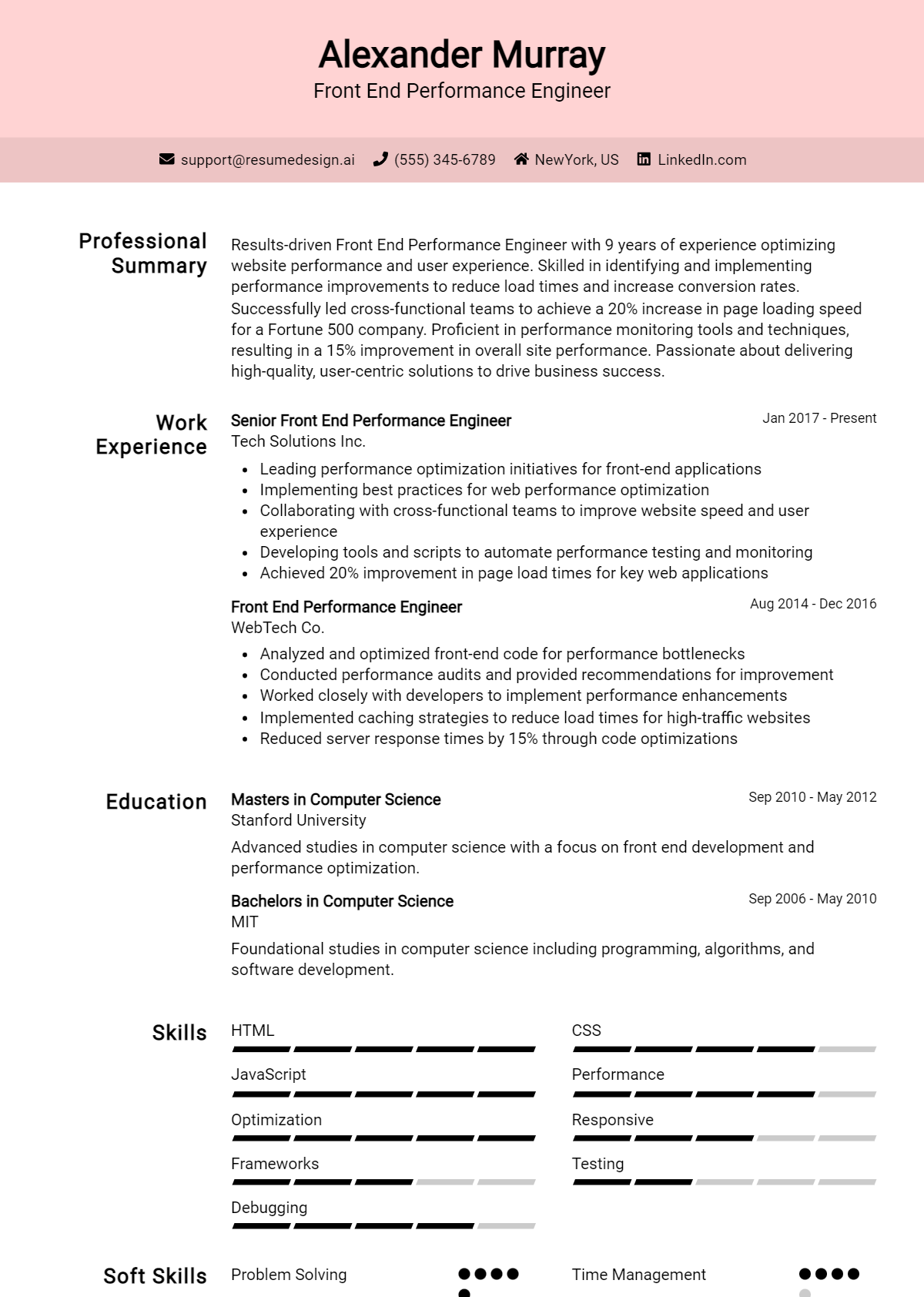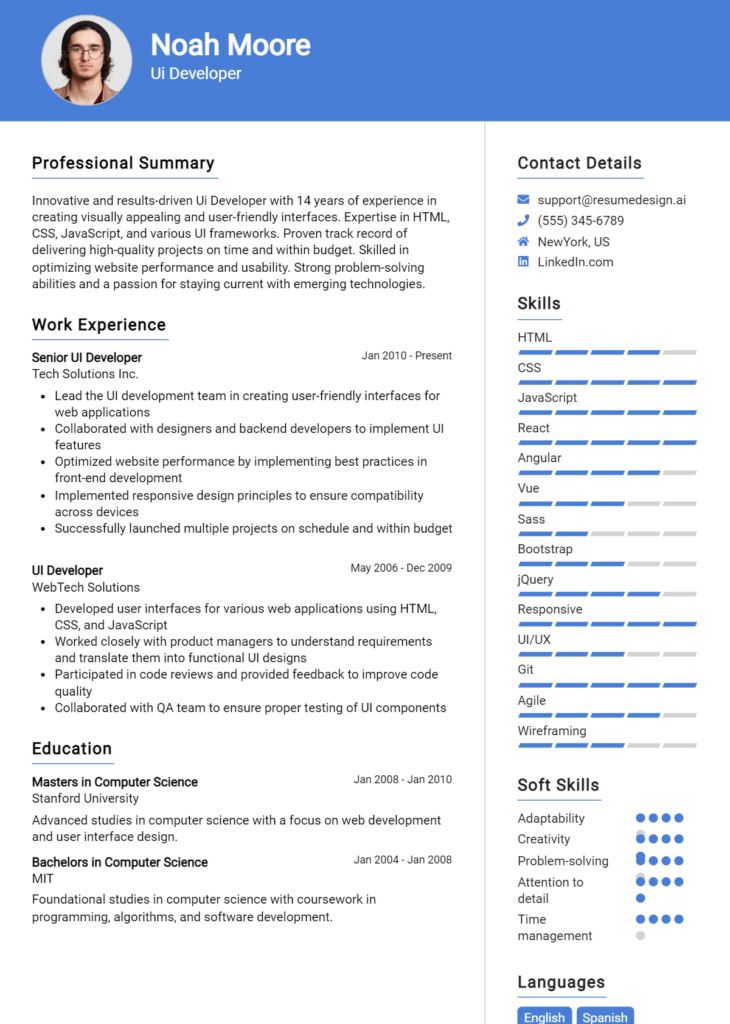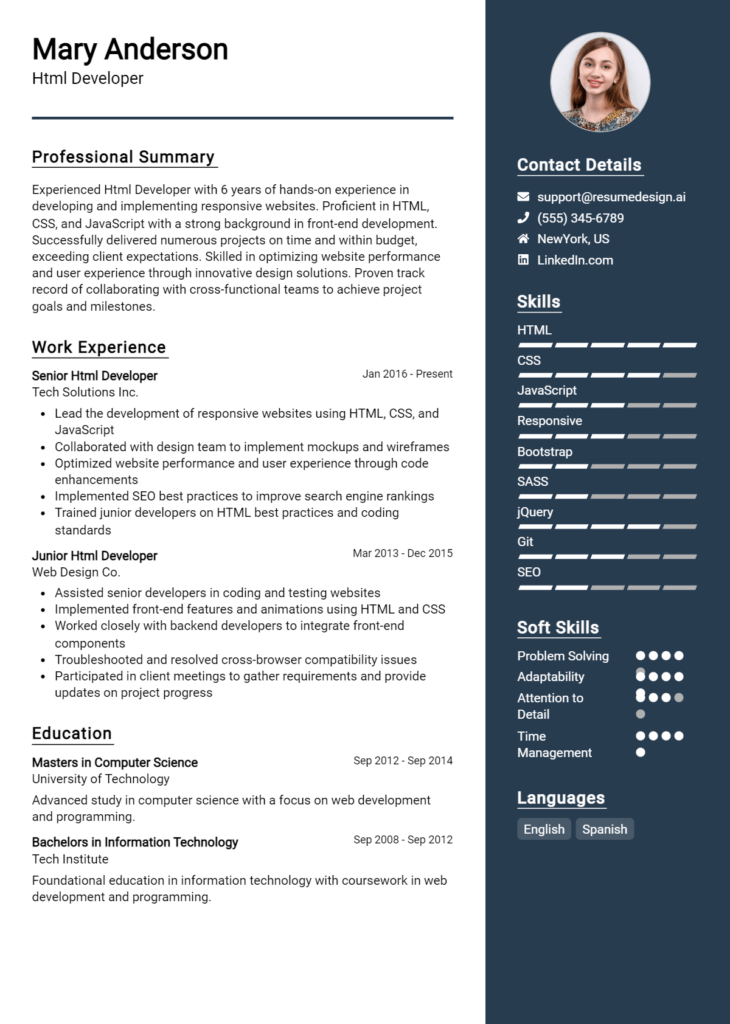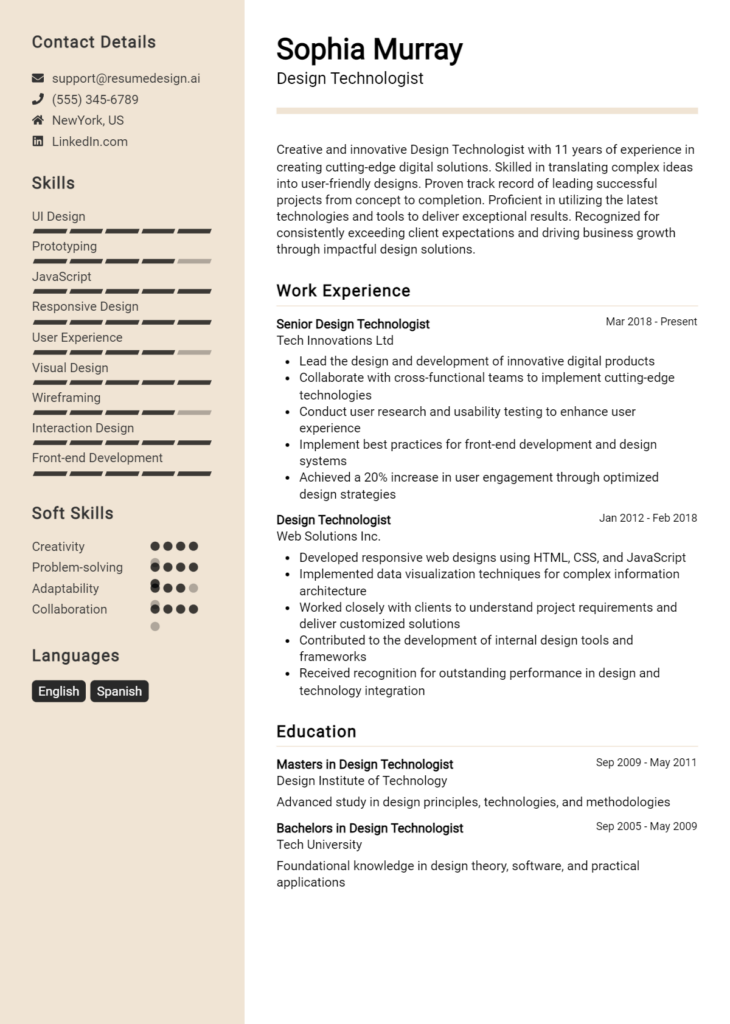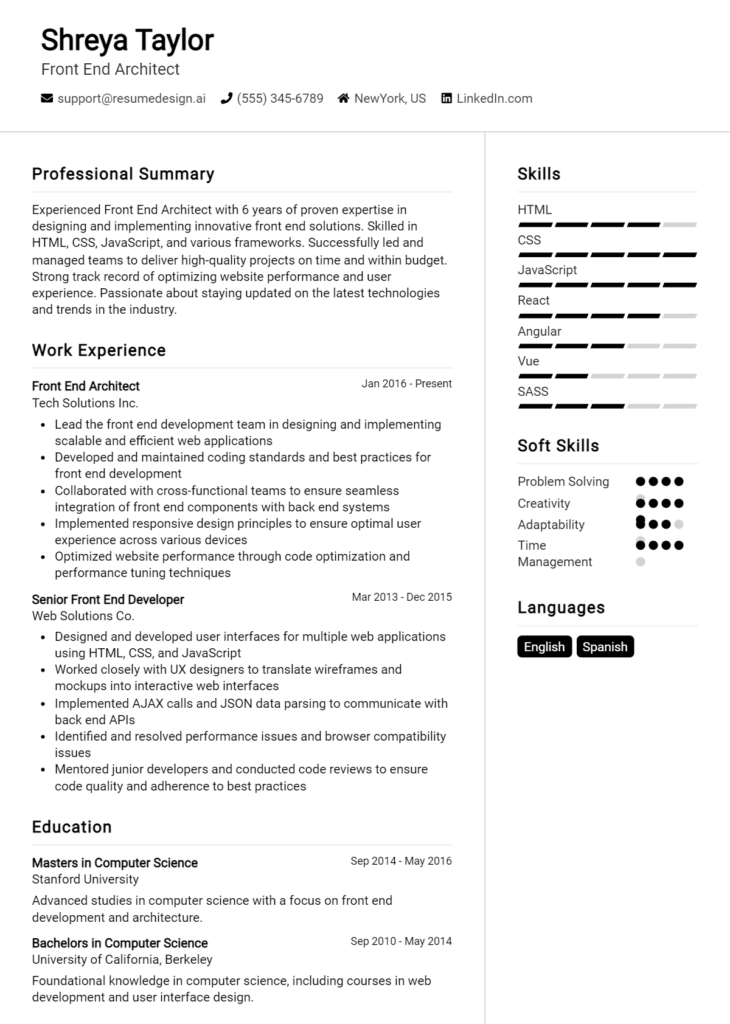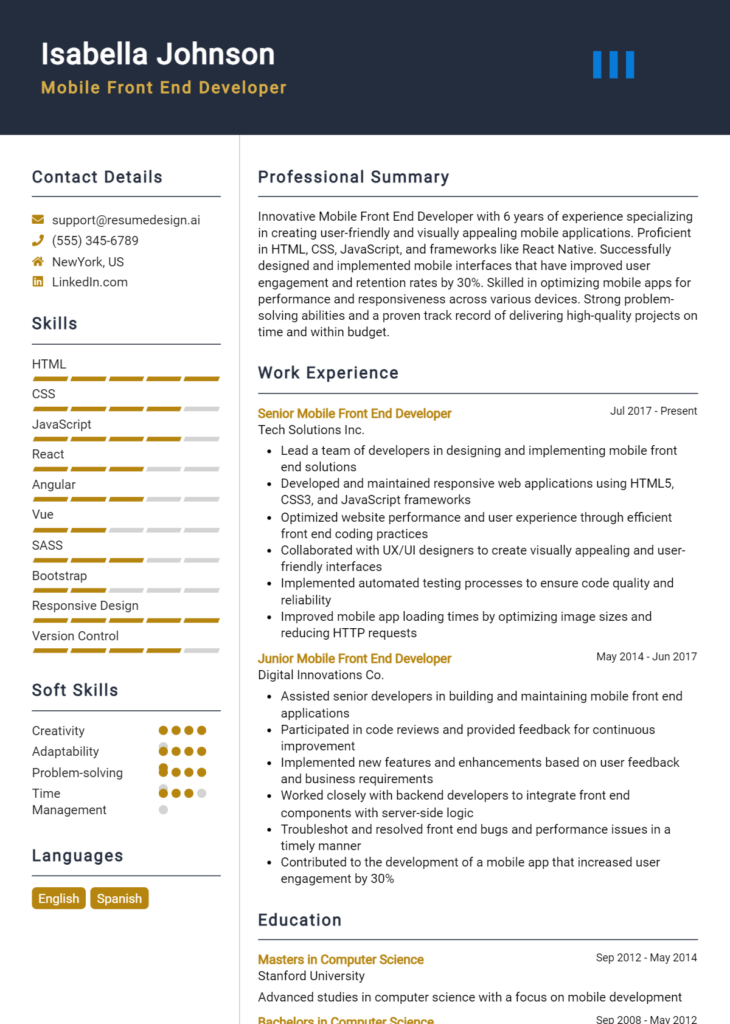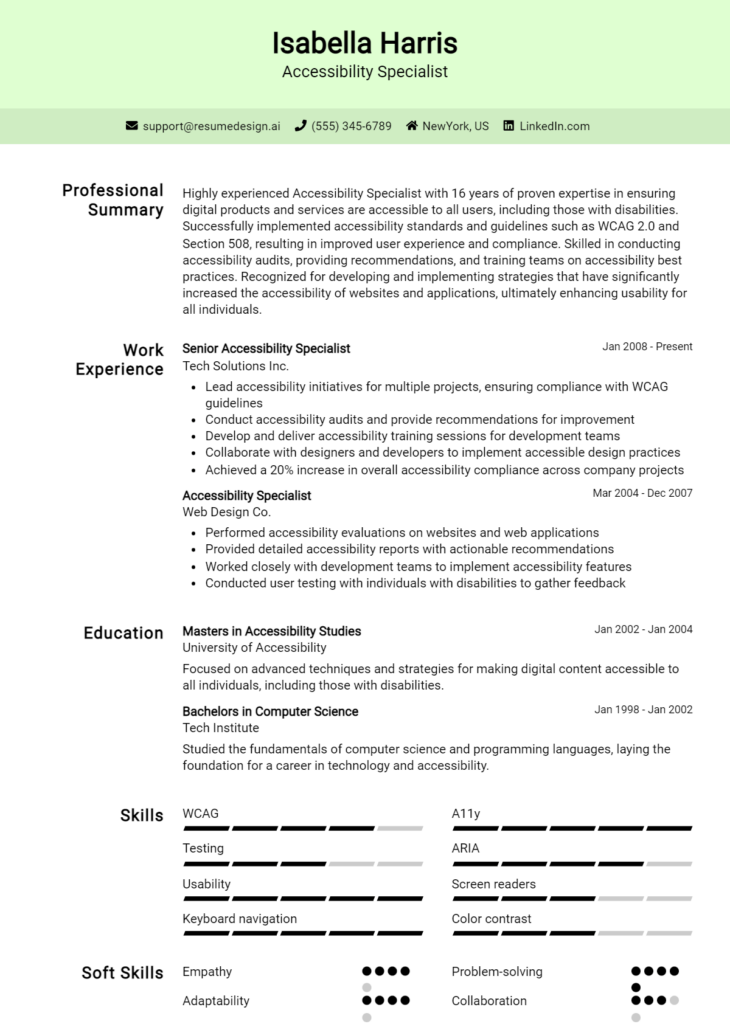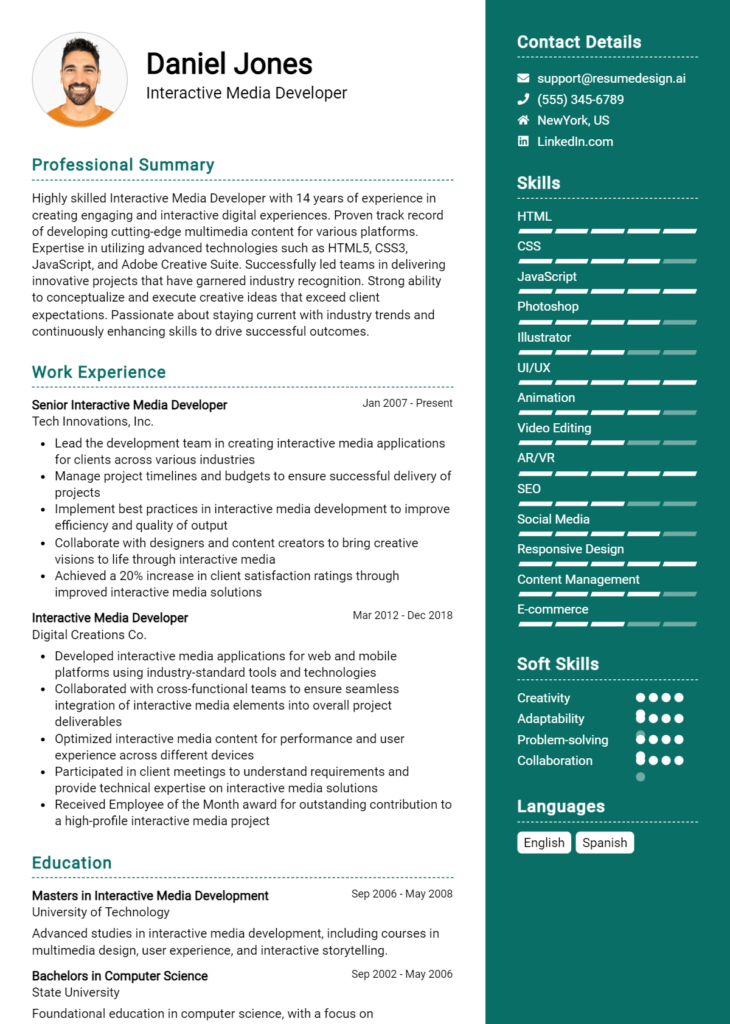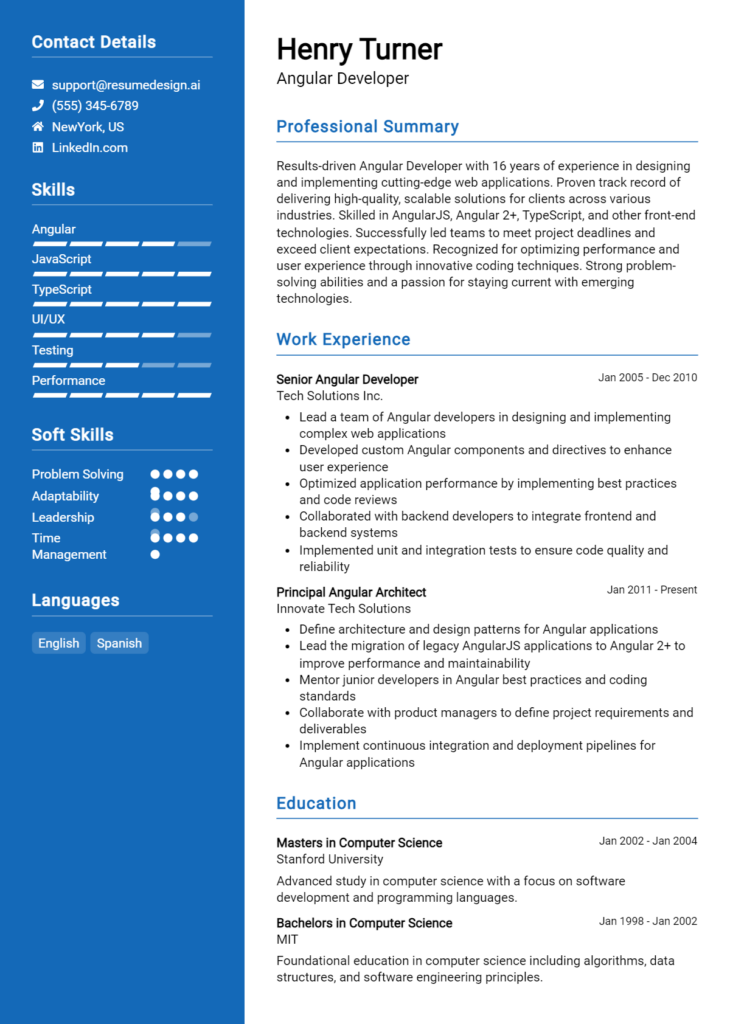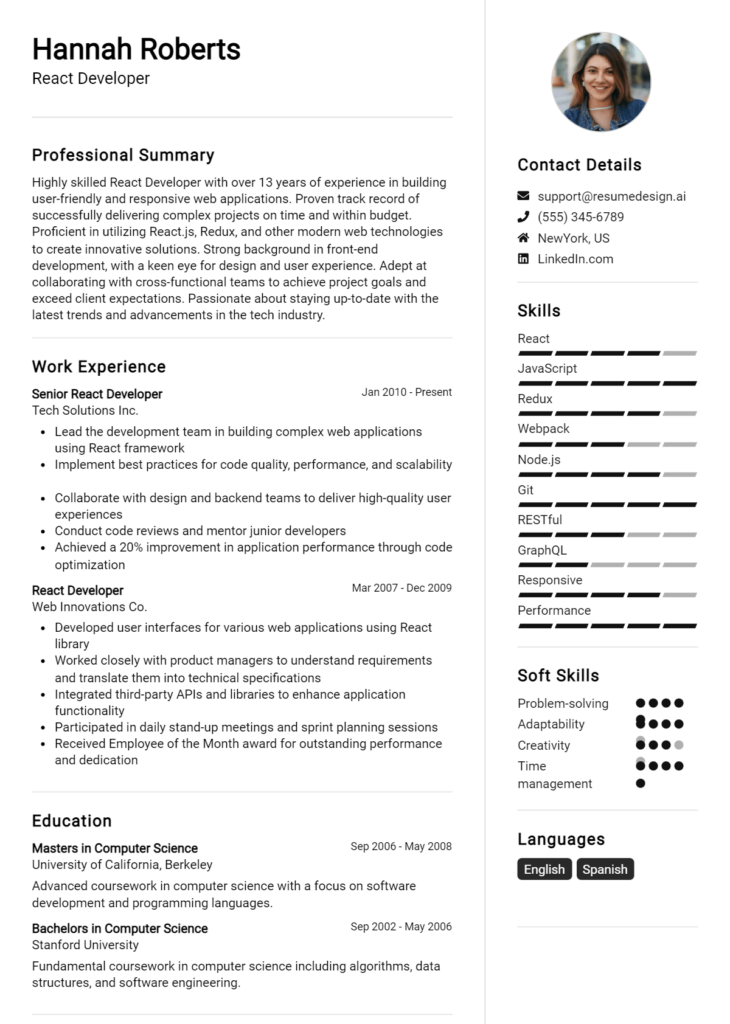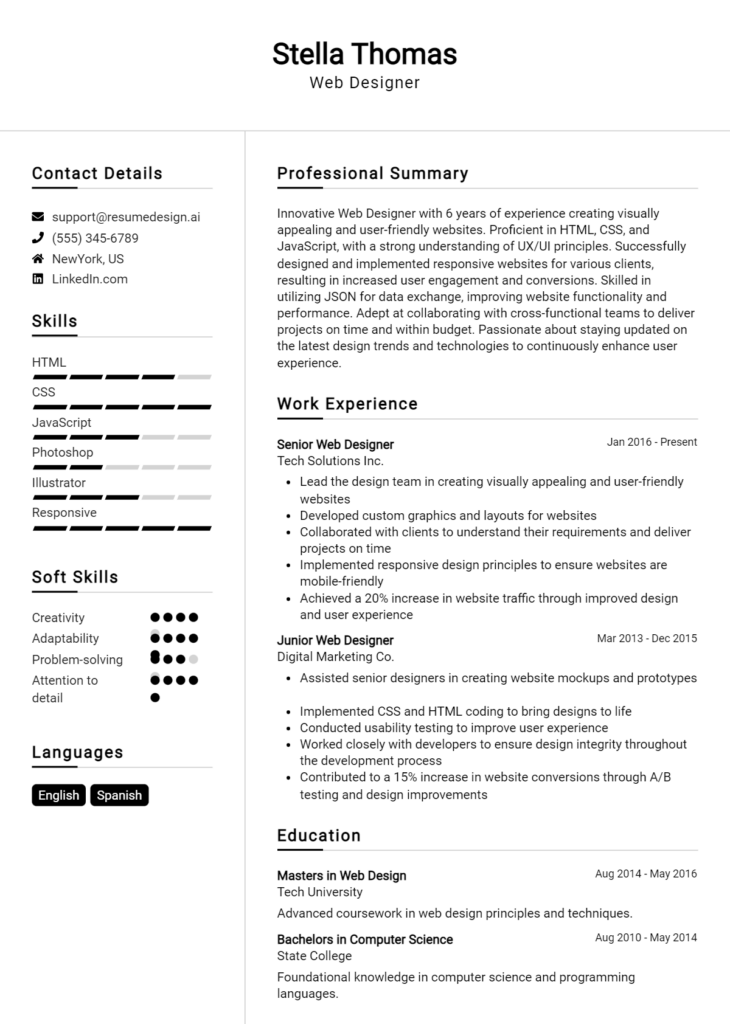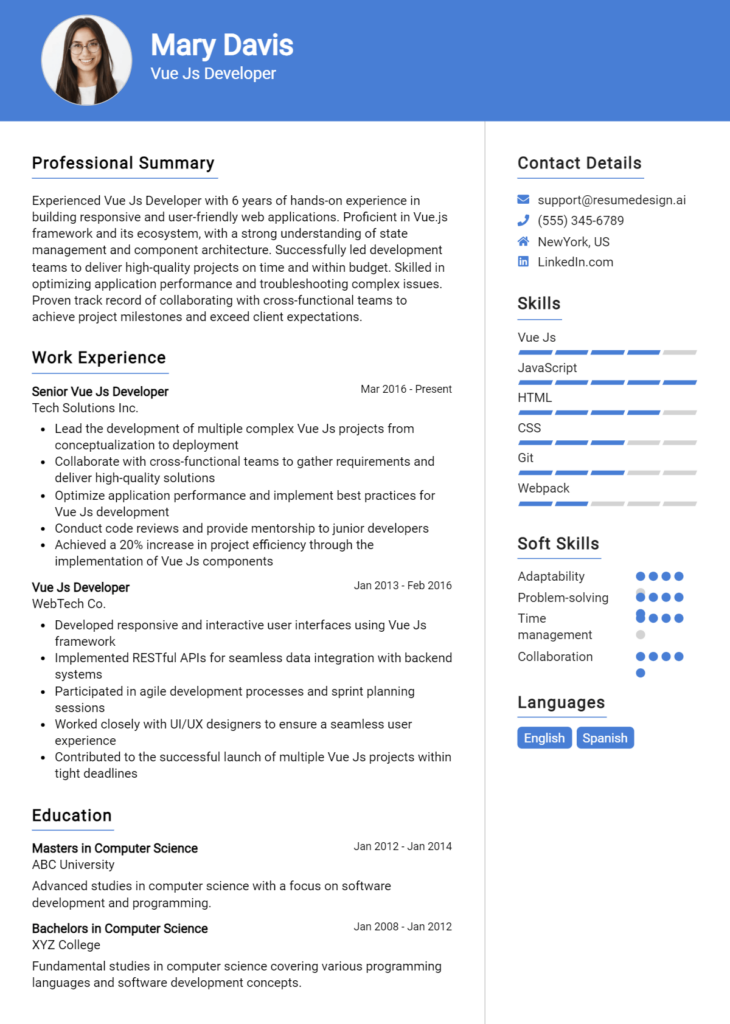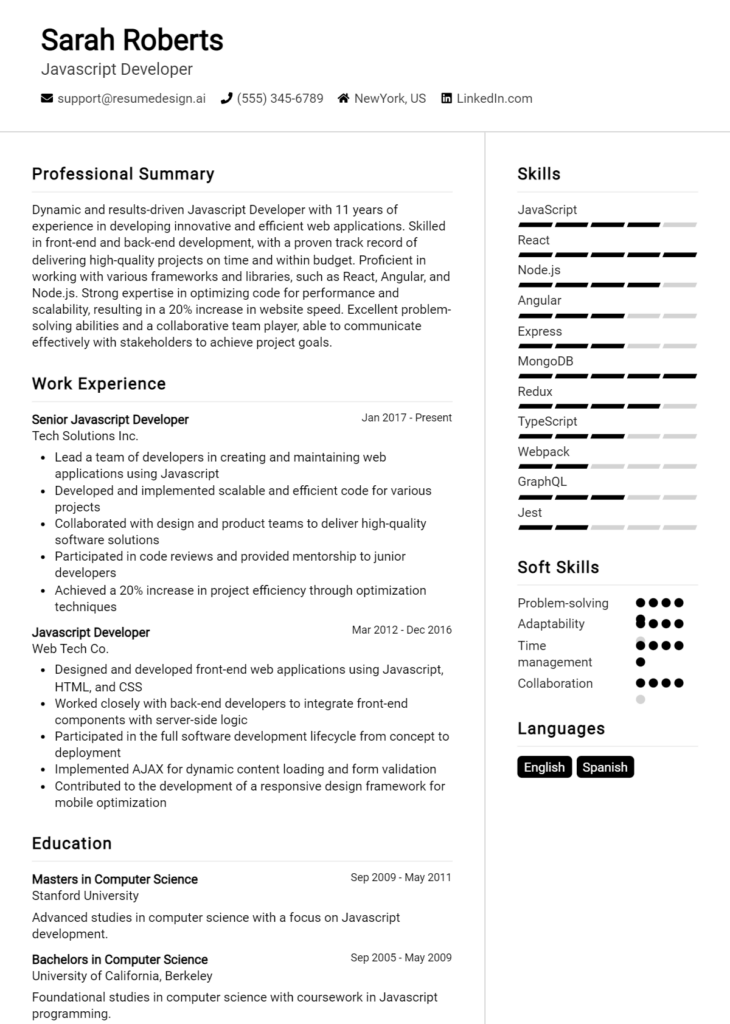Front-End Performance Engineer Core Responsibilities
A Front-End Performance Engineer plays a crucial role in optimizing web applications, ensuring seamless user experiences across devices. This professional collaborates with developers, UX/UI designers, and product teams, employing technical expertise in coding and performance metrics to identify and resolve bottlenecks. Strong problem-solving abilities, along with operational skills in testing and analysis, are essential for success. These competencies contribute significantly to an organization's goals by enhancing site speed and responsiveness. A well-structured resume can effectively showcase these qualifications, making a compelling case for potential employers.
Common Responsibilities Listed on Front-End Performance Engineer Resume
- Optimize front-end performance through code analysis and testing.
- Collaborate with cross-functional teams to enhance user experience.
- Implement performance monitoring tools and techniques.
- Conduct A/B testing and analyze results for performance improvements.
- Identify and troubleshoot performance bottlenecks in web applications.
- Develop and maintain performance documentation and best practices.
- Stay updated on emerging technologies and performance trends.
- Perform audits and recommend optimizations for existing applications.
- Utilize metrics to track performance improvements over time.
- Assist in optimizing server-side rendering and client-side rendering.
- Collaborate with DevOps teams for deployment and scaling strategies.
- Provide training and guidance on performance optimization techniques.
High-Level Resume Tips for Front-End Performance Engineer Professionals
In today's competitive job market, a well-crafted resume is essential for Front-End Performance Engineer professionals seeking to make a lasting impression on potential employers. Your resume is often the first point of contact between you and your dream job, serving as a reflection of your skills, achievements, and professional journey. It’s crucial to present a document that not only showcases your technical expertise but also highlights your contributions to previous projects and teams. This guide will provide practical and actionable resume tips specifically tailored for Front-End Performance Engineer professionals, helping you to stand out in a crowded field.
Top Resume Tips for Front-End Performance Engineer Professionals
- Tailor your resume to the specific job description by using keywords from the posting.
- Start with a strong summary statement that emphasizes your experience in front-end performance engineering.
- Showcase relevant work experience, focusing on roles that involved performance optimization and user experience improvements.
- Quantify your achievements by including metrics that demonstrate the impact of your work, such as improved load times or increased user engagement.
- Highlight industry-specific skills such as proficiency in performance testing tools, frameworks, and methodologies.
- Incorporate examples of successful projects that you have led or contributed to, detailing your specific role in enhancing performance.
- Use a clean, professional layout that enhances readability and makes important information easy to find.
- Include relevant certifications or training that demonstrate your commitment to continuous improvement in performance engineering.
- Keep your resume concise, ideally one page, while ensuring all critical information is included.
- Review and proofread your resume for any grammatical or typographical errors, as these can detract from your professionalism.
By implementing these tips, you can significantly increase your chances of landing a job in the Front-End Performance Engineer field. A well-structured and targeted resume not only showcases your qualifications but also conveys your dedication to optimizing performance and enhancing user experience, making you a standout candidate in the eyes of potential employers.
Why Resume Headlines & Titles are Important for Front-End Performance Engineer
In the competitive field of front-end engineering, a well-crafted resume headline or title serves as a vital first impression that can significantly influence hiring managers. A strong headline immediately captures attention, summarizing a candidate's key qualifications in a concise and impactful manner. For Front-End Performance Engineers, who specialize in optimizing web applications for speed and efficiency, a headline should encapsulate their technical expertise, relevant skills, and industry experience. By ensuring that the headline is both relevant and directly related to the job being applied for, candidates can effectively communicate their value proposition right from the start.
Best Practices for Crafting Resume Headlines for Front-End Performance Engineer
- Keep it concise: Aim for a headline that is brief yet informative, ideally no more than 10-12 words.
- Be specific: Ensure your headline clearly reflects your role and expertise in front-end performance engineering.
- Highlight key skills: Incorporate relevant technical skills or methodologies that align with the job description.
- Use impactful language: Choose strong action words that convey your contributions and accomplishments.
- Include relevant experience: Mention the years of experience or specific industries if applicable.
- Tailor for the role: Customize your headline for each application to match the job requirements.
- Avoid jargon: Use clear language that is easily understood by hiring managers, avoiding overly technical terms.
- Showcase results: If possible, hint at measurable outcomes or achievements to entice further interest.
Example Resume Headlines for Front-End Performance Engineer
Strong Resume Headlines
"Results-Driven Front-End Performance Engineer with 5+ Years of Experience in Optimizing Web Applications"
“Expert in Front-End Performance Optimization, Specializing in JavaScript and CSS Enhancements”
“Performance-Focused Front-End Engineer Committed to Delivering Fast and Efficient User Experiences”
Weak Resume Headlines
“Front-End Developer”
“Experienced Engineer”
The strong headlines are effective because they provide specific information about the candidate's expertise, skills, and accomplishments, making them immediately relevant to the job at hand. They create an image of a focused professional who understands the importance of performance in front-end development. In contrast, the weak headlines fail to impress as they are vague, generic, and do not convey any unique value or qualifications, leaving hiring managers with little motivation to delve deeper into the resume.
Writing an Exceptional Front-End Performance Engineer Resume Summary
A well-crafted resume summary is essential for a Front-End Performance Engineer, as it serves as the first impression a hiring manager will have of a candidate. This brief yet impactful section quickly captures attention by highlighting key skills, relevant experience, and notable accomplishments that align with the job role. A strong summary is concise, directly tailored to the specific position being applied for, and effectively showcases what sets the candidate apart in a competitive job market.
Best Practices for Writing a Front-End Performance Engineer Resume Summary
- Quantify Achievements: Use specific numbers and metrics to demonstrate the impact of your work.
- Focus on Relevant Skills: Highlight technical proficiencies and tools that are directly applicable to front-end performance engineering.
- Tailor for the Job Description: Customize your summary to align with the specific responsibilities and requirements listed in the job posting.
- Use Action Verbs: Start sentences with strong action verbs to convey a sense of initiative and results.
- Keep it Concise: Aim for 3-5 sentences that communicate your value without overwhelming the reader.
- Showcase Soft Skills: In addition to technical expertise, mention relevant soft skills such as problem-solving and collaboration.
- Highlight Key Technologies: Mention specific frameworks, libraries, or tools you are proficient in that are essential for front-end performance.
- Include Awards or Recognitions: If applicable, mention any accolades or recognitions that reinforce your expertise in the field.
Example Front-End Performance Engineer Resume Summaries
Strong Resume Summaries
"Results-driven Front-End Performance Engineer with over 5 years of experience optimizing website load times by 40%, utilizing modern frameworks like React and Vue.js. Proven ability to enhance user experience and boost conversion rates through effective performance tuning and analytics."
"Detail-oriented Front-End Performance Engineer with expertise in JavaScript, CSS, and HTML, successfully reducing page rendering times by 60% for high-traffic e-commerce sites. Recognized for implementing innovative solutions that improved overall site performance and user engagement."
"Dynamic Front-End Performance Engineer with a solid track record of enhancing application speed and efficiency. Spearheaded a team project that achieved a 50% reduction in load times while increasing overall customer satisfaction by 30%."
Weak Resume Summaries
"Front-End Performance Engineer with experience in web development looking for a new opportunity. I work well in teams and am familiar with various technologies."
"Enthusiastic engineer skilled in front-end development. I have some experience with performance optimization and enjoy coding."
The strong resume summaries stand out due to their quantifiable results, specific mention of relevant skills and technologies, and direct relevance to the role of a Front-End Performance Engineer. They effectively showcase the candidate's accomplishments and how they can add value to a prospective employer. In contrast, the weak summaries lack specificity and measurable outcomes, making them less engaging and impactful, failing to convey the candidate's true capabilities and potential contributions to the role.
Work Experience Section for Front-End Performance Engineer Resume
The work experience section of a Front-End Performance Engineer resume is crucial as it provides a detailed overview of a candidate's technical skills and past contributions in the field. This section allows potential employers to assess the engineer's ability to optimize web applications, manage projects, and collaborate with teams to deliver high-quality products. By quantifying achievements and aligning experiences with industry standards, candidates can effectively showcase their value and expertise, making a compelling case for their candidacy in a competitive job market.
Best Practices for Front-End Performance Engineer Work Experience
- Highlight specific technologies and tools used in past projects to demonstrate technical expertise.
- Quantify achievements, such as performance improvements in load times or user engagement metrics.
- Showcase leadership roles in team projects, emphasizing collaboration and mentorship.
- Use action verbs to begin each bullet point, creating a dynamic and engaging narrative.
- Align your experience with industry standards and best practices for front-end performance optimization.
- Include relevant certifications or training that enhance your qualifications in performance engineering.
- Tailor your work experience to the job description to highlight the most relevant skills and achievements.
- Focus on outcomes and results rather than just duties, illustrating the impact of your work.
Example Work Experiences for Front-End Performance Engineer
Strong Experiences
- Led a team of 5 engineers to optimize a large-scale e-commerce platform, resulting in a 40% reduction in page load time and a 25% increase in conversion rates.
- Implemented a performance monitoring system that identified bottlenecks, improving overall application speed by 30% and enhancing user experience ratings from 3.5 to 4.7 stars.
- Collaborated with cross-functional teams to integrate lazy loading techniques, achieving a 50% decrease in initial load time and significantly reducing bounce rates.
- Conducted regular performance audits and A/B tests, enabling data-driven decisions that led to a 20% increase in user engagement across multiple platforms.
Weak Experiences
- Worked on various projects related to front-end performance.
- Assisted in optimizing website speed.
- Participated in team meetings to discuss performance issues.
- Helped with minor improvements to existing applications.
The examples listed above are considered strong because they clearly quantify achievements, demonstrate technical leadership, and highlight collaboration with teams to achieve significant results. In contrast, the weak experiences lack specific details and measurable outcomes, making them less impactful and failing to convey the candidate's true capabilities in front-end performance engineering.
Education and Certifications Section for Front-End Performance Engineer Resume
The education and certifications section of a Front-End Performance Engineer resume plays a crucial role in showcasing a candidate's academic credentials and professional development. This section not only highlights relevant degrees and certifications but also emphasizes the candidate's commitment to continuous learning in an ever-evolving field. By including pertinent coursework, industry-recognized certifications, and specialized training, candidates can significantly enhance their credibility and demonstrate alignment with the specific requirements of the job role, thereby increasing their chances of standing out to potential employers.
Best Practices for Front-End Performance Engineer Education and Certifications
- Prioritize relevant degrees in fields such as Computer Science, Web Development, or Software Engineering.
- Include certifications from recognized industry bodies, such as Google, W3C, or Adobe.
- List any specialized training or workshops related to front-end performance optimization or web technologies.
- Provide context for coursework that is directly applicable to front-end performance, like Web Performance Optimization or Responsive Web Design.
- Showcase advanced credentials, such as a Master's degree or specialized industry certifications.
- Regularly update this section to reflect new qualifications or courses completed after significant industry changes.
- Use clear formatting to make this section easy to read and navigate for hiring managers.
- Tailor the education and certifications to match the specific requirements outlined in the job description.
Example Education and Certifications for Front-End Performance Engineer
Strong Examples
- Bachelor of Science in Computer Science, State University, 2018
- Google Mobile Web Specialist Certification, 2021
- Completed coursework in Web Performance Optimization, including hands-on projects in code minification and caching strategies.
- Certified Front-End Web Developer by W3C, 2020
Weak Examples
- Associate Degree in General Studies, Community College, 2015
- Certification in Basic Computer Literacy, 2019
- Completed a course on Microsoft Office Applications, 2020
- High School Diploma, 2014
The strong examples are considered effective because they directly relate to the skills and knowledge required for a Front-End Performance Engineer, showcasing relevant degrees and certifications that enhance the candidate's qualifications. In contrast, the weak examples lack relevance to the specific job role, focusing instead on general education or outdated certifications that do not support the candidate’s expertise in front-end performance engineering.
Top Skills & Keywords for Front-End Performance Engineer Resume
In the competitive field of front-end development, a Front-End Performance Engineer plays a critical role in ensuring that web applications are not only visually appealing but also perform optimally. The skills highlighted in a resume are essential for showcasing a candidate's abilities to improve load times, enhance user experience, and optimize resource usage. A well-crafted resume with the right blend of hard and soft skills can set candidates apart from the competition, demonstrating their expertise in performance engineering and their ability to work collaboratively within a team. To maximize your potential as a Front-End Performance Engineer, it's important to understand and effectively present these skills in your resume.
Top Hard & Soft Skills for Front-End Performance Engineer
Soft Skills
- Strong communication skills
- Problem-solving abilities
- Attention to detail
- Time management
- Team collaboration
- Adaptability
- Critical thinking
- Creativity
- User-centric mindset
- Analytical thinking
- Ability to work under pressure
- Empathy for users
Hard Skills
- Proficiency in HTML, CSS, and JavaScript
- Experience with performance testing tools (e.g., Lighthouse, WebPageTest)
- Knowledge of web optimization techniques (e.g., image compression, lazy loading)
- Familiarity with version control systems (e.g., Git)
- Understanding of browser rendering processes
- Skills in responsive design and cross-browser compatibility
- Experience with content delivery networks (CDNs)
- Familiarity with frameworks and libraries (e.g., React, Angular, Vue.js)
- Proficiency in debugging and profiling tools
- Knowledge of web accessibility standards (e.g., WCAG)
- Understanding of HTTP/2 and other web protocols
- Experience with automated testing frameworks
By showcasing both your skills and work experience, you can effectively communicate your qualifications and readiness to excel in the role of a Front-End Performance Engineer.
Stand Out with a Winning Front-End Performance Engineer Cover Letter
Dear [Hiring Manager's Name],
I am writing to express my interest in the Front-End Performance Engineer position at [Company Name], as advertised on [Job Board/Company Website]. With a solid background in web development combined with a robust understanding of front-end performance optimization, I am excited about the opportunity to contribute to your team. My experience in implementing performance best practices and utilizing tools such as Lighthouse and WebPageTest aligns well with your requirements, and I am eager to bring my expertise to [Company Name].
In my previous role at [Previous Company Name], I successfully led a project that improved page load times by over 30%, significantly enhancing user experience and increasing conversion rates. By conducting thorough performance audits and analyzing user interactions, I identified bottlenecks and implemented solutions such as code splitting, lazy loading, and image optimization. My collaborative approach allowed me to work closely with back-end developers and designers, ensuring that all aspects of the application were optimized for performance without compromising on quality or visual appeal.
I am particularly impressed by [Company Name]'s commitment to innovation and continuous improvement, and I am excited about the prospect of helping to push the boundaries of front-end performance. I am adept at using modern frameworks and libraries, and I stay updated on the latest trends and techniques in performance engineering to ensure that I can contribute effectively from day one. I am confident that my technical skills, combined with my passion for creating fast, efficient, and user-friendly web experiences, would make me a valuable addition to your team.
Thank you for considering my application. I look forward to the opportunity to discuss how my skills and experiences align with the goals of [Company Name]. I am eager to contribute to your team’s success and help deliver exceptional web experiences for your users.
Sincerely,
[Your Name]
[Your LinkedIn Profile]
[Your Contact Information]
Common Mistakes to Avoid in a Front-End Performance Engineer Resume
When crafting a resume for a Front-End Performance Engineer position, it’s crucial to avoid certain common pitfalls that can undermine your chances of landing an interview. A well-structured resume should not only highlight your technical skills but also effectively communicate your experience and accomplishments. Here are some common mistakes to watch out for:
Vague Job Descriptions: Failing to provide specific details about your previous roles can leave hiring managers unclear about your actual contributions. Always quantify achievements and describe your responsibilities in detail.
Ignoring Performance Metrics: Not highlighting key performance indicators (KPIs) or metrics related to speed, load time, or user engagement can make your resume less compelling. Use data to showcase your impact on performance.
Neglecting Soft Skills: While technical skills are important, soft skills like communication and teamwork are equally valuable. Omitting these can result in a one-dimensional portrayal of your capabilities.
Overloading with Technical Jargon: Using too much technical jargon without context can confuse hiring managers who may not be as technically savvy. Balance technical terms with clear explanations of your work.
Lack of Tailoring: Sending out a generic resume for multiple applications can be detrimental. Tailor your resume to each job description, incorporating relevant keywords and skills that align with the specific role.
Failing to Showcase Continuous Learning: Not mentioning ongoing education or certifications in performance engineering can suggest a lack of commitment to professional growth. Highlight courses, conferences, or relevant workshops you've attended.
Excessive Length or Irrelevance: A long resume filled with irrelevant information can dilute your key strengths. Aim for brevity by focusing on the most relevant experiences and skills related to front-end performance.
Poor Formatting: A cluttered or unprofessional layout can detract from the content of your resume. Use clear headings, bullet points, and a clean design to enhance readability and make a strong first impression.
Conclusion
As we've explored the essential skills and responsibilities of a Front-End Performance Engineer, it's clear that this role is pivotal in enhancing user experience through optimized web performance. Key takeaways include the importance of mastering tools like Lighthouse and WebPageTest, understanding critical rendering paths, and the need for continuous monitoring of performance metrics.
In conclusion, to stand out in this competitive field, it's crucial to have a polished and effective resume that highlights your technical expertise and relevant experiences. We encourage you to take a moment to review your Front-End Performance Engineer resume.
To assist you in this process, consider utilizing the following resources:
- Resume Templates to find a layout that suits your style.
- Resume Builder for an easy and efficient way to create your resume.
- Resume Examples to inspire and guide you in showcasing your skills.
- Cover Letter Templates to complement your resume effectively.
Take action today and elevate your job application materials to reflect your best self!

